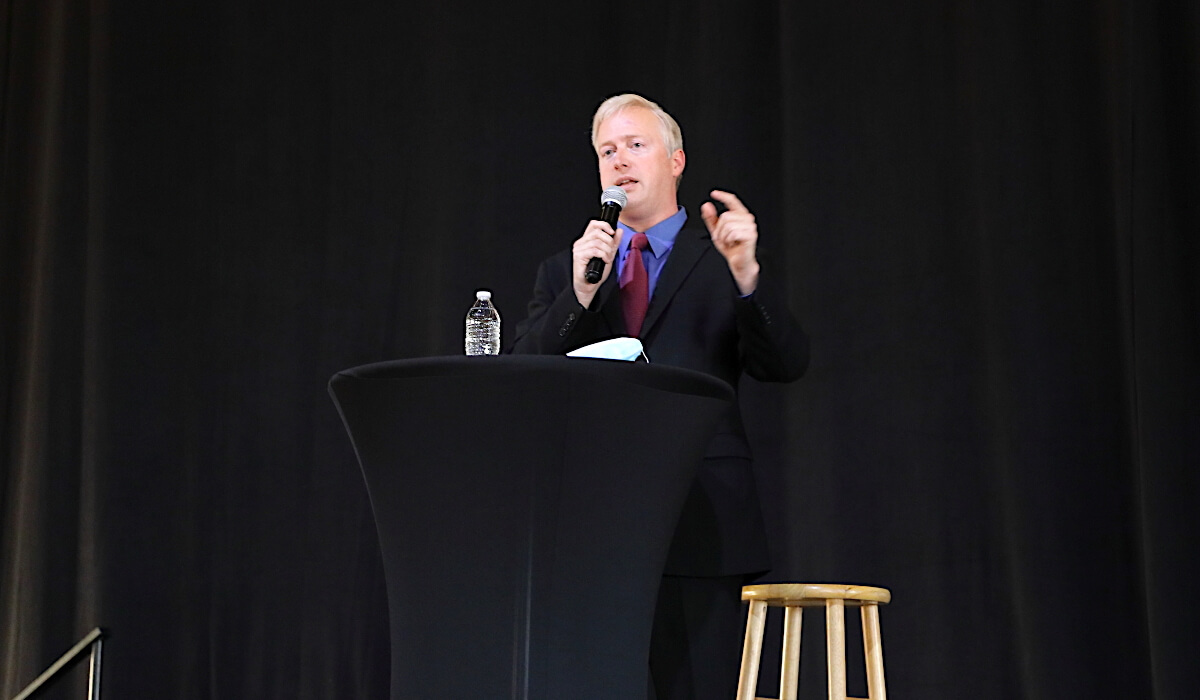
Oklahoma County elected officials are slated to get a pay raise in 2023, though some will be seeing a larger increase than others owing to state statutes that govern county officers’ ability to raise their own pay and when those pay raises take effect. But one commissioner believes the planned increase is unfair.
In 2022, elected Oklahoma County officials made $122,637.50. District 1 Commissioner Carrie Blumert, incoming District 3 Commissioner Myles Davidson, County Assessor Larry Stein and County Treasurer Butch Freeman will see their salary increase by nearly $13,000, to $135,087, for 2023. So will whoever wins the April special election for county clerk.
County Court Clerk Rick Warren, District 2 Commissioner Brian Maughan and Sheriff Tommie Johnson will get an increase of about $8,000, raising their pay to $130,087.
Under state statute, county officials can get an additional $5,000 in counties that meet certain population and tax-base requirements. But current officials aren’t eligible for that money until they start a new term. Blumert, Davidson, Stein and Freeman won elections in 2022 and are starting new terms today, while the others are not up for reelection until 2024.
The raise was approved by the county’s budget board at its Dec. 15 meeting. The board is made up of the county’s elected officials, with the exception of the district attorney, who is not affected by the pay raise.
‘I made a campaign pledge that I would never vote for a raise for myself’

Maughan was represented at the Dec. 15 budget board meeting by his chief deputy, Michael Taylor, who cast the lone “No” vote on the increase. Maughan said he doesn’t support the raises based on a promise he made when first elected, in 2008, and because of concerns about fairness.
“I made a campaign pledge that I would never vote for a raise for myself,” Maughan said. “I don’t think it’s ideal to have one group of elected officials making a different amount and others making another amount. I don’t think that would work anywhere else. Imagine having one House member making a different salary than someone in another district. It would never work.”
All county employees — including eligible county officials — received an 8.5 percent pay increase earlier in 2022. But under state law, employees in county government can’t be paid more than the elected official they work for. Maughan said approving raises for some elected officials and not for others effectively sets different pay caps for county employees depending on which office they work in.
“It suppresses staff pay across the board, and I think that’s a form of discrimination,” he said.
District 1 Commissioner Carrie Blumert said voting to raise her own pay as an elected official always feels awkward, but getting the 8.5 percent raise for county employees was her primary concern.
“I was proud and happy to support that increase,” she said. “It was to catch employees up given the current level of inflation. We also included some merit-based increases up to 2 percent, so supervisors could give another 2 percent that was merit based. That allowed up to a 10 percent increase for some employees. So when the conversation came up to increase the pay for elected officials, the fact that we did those raises earlier this year for everyone was the only reason I would consider it.”
Outgoing District 3 Commissioner Kevin Calvey, who is leaving office this morning after losing the race for Oklahoma County District Attorney in November, supported the pay increase for county elected officials. Calvey opposed the 8.5 percent increase in 2022 but said at the December budget board meeting that he was happy to increase the pay for those who will remain in county government after he’s gone.
“I think there are valid arguments on both sides of this,” he said in the Dec. 15 meeting. “I voted against the last pay raise because it benefited me. This one does not, so I am happy to make the motion to approve it.”
Retaining staff a factor

Blumert said another reason she has supported recent pay raises is that the county often struggles to recruit and retain staff in key areas such as IT and facilities maintenance.
“It’s hard to keep qualified staff in those areas,” she said. “It’s hard to compete with the private sector when it comes to pay. But we have excellent benefits, which is something I always mention when we’re interviewing potential new staff. The retirement and health care plans are very good. We may not pay the most, but we have that going for us.”
Elected officials in Oklahoma County, which is the state’s most populous county, make more than their counterparts in other parts of the state. In the second most populated county, Tulsa County, elected officials make $116,000 after voting for pay increases in 2014, 2016 and 2018.
“Two years ago, we did a pay increase to catch up, but prior to that it had been about 12 years,” Blumert said. “Tulsa County has regularly taken votes to raise pay and we traditionally haven’t done that, so when we do it becomes a news story.”
Blumert said she hasn’t heard from constituents opposed to the most recent pay increase.
“In the past, it has come up when I’m on the phone with constituents or at a town hall, and my response is always the same,” Blumert said. “I will consider them if it allows me to bump up top employees, which helps us retain staff.”
Maughan said he understands the need to keep quality staff. For instance, he said Taylor, his chief deputy, is departing for a higher paying job in the private sector. But Maughan said he believes the way the pay raises have been handled does not solve the problem.
“That was supposed to be the driving force behind it, to help retain top level employees and be competitive but with this,” he said. “They are still going to be subjected to this lower amount depending on who they work for.”




















